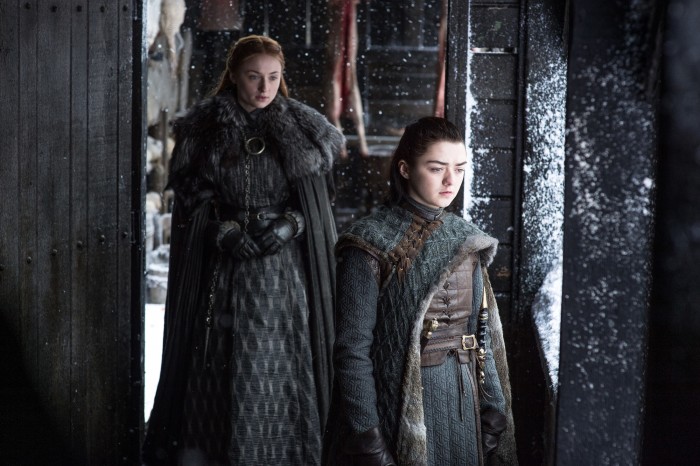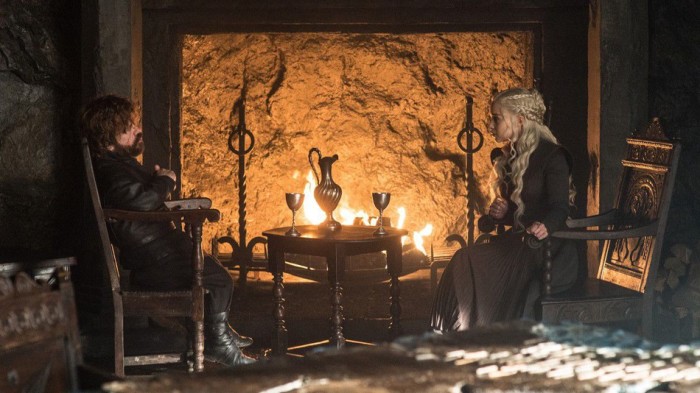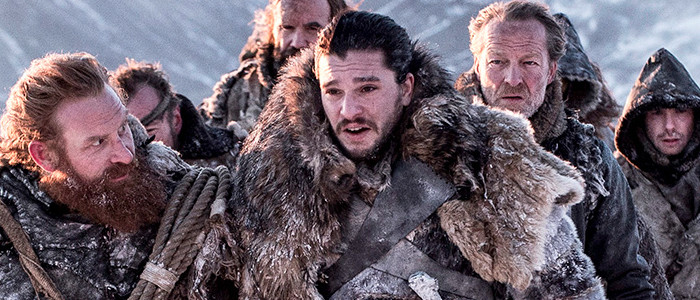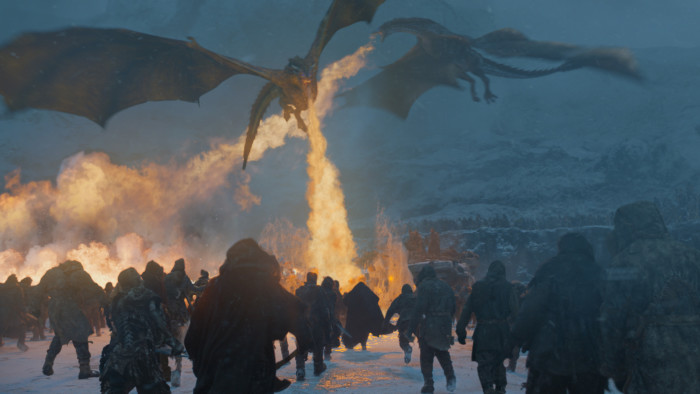Did 'Game Of Thrones' Jump The Shark With "Beyond The Wall"?
(Welcome to The Soapbox, the space where we get loud, feisty, political, and opinionated about anything and everything. In this edition: did Game of Thrones jump the shark in its most recent episode?)KnowYourMeme defines the term "jumping the shark" as "an idiomatic expression describing a pivotal moment when a successful creative effort begins a significant decline in quality." We won't be able to look back and see if Game of Thrones has hit that "pivotal moment" until the series is finished, or at least until a few more episodes have aired, but from where I stand, this week's episode ("Beyond The Wall") feels pretty damn pivotal – and I'm not thrilled about the new direction that pivot implies.
In our own Jacob Hall's review of "Beyond The Wall," Jacob talks about the excitement he gets from seeing disparate characters thrown together as the show rushes toward its endgame. In a conversation we had for the site about Game of Thrones season 7's increased pacing, he and I talked about how geek-friendly properties can provide satisfying moments, but those often come at the cost of sacrificing some of the established rules of the world. Before, Game of Thrones didn't need to choose one or the other: they regularly delivered both, and in ways that were immensely satisfying. The Battle of Blackwater. The Red Wedding. The Purple Wedding. The Mountain vs. The Viper. These are all "spectacle" moments, but they're also all character-driven, with clear and sensible motivations in place for everyone involved. I've felt Game of Thrones veering away from that mentality for a while now, but it crystallized in a huge way in "Beyond The Wall," an episode that, for the first time, made me wonder if the show has crossed a threshold which it can never uncross.
Before I go any further, I want to echo something Jacob said in our podcast discussion about this very topic: the only reason I'm so critical about this show is because I love it so much. So anyone about to berate me for nitpicking or just tearing something down for the sake of doing it, please save your breath and understand that all of this is coming from an honest place.
Let's run through the major beats of the episode.
Arya v Sansa
I enjoyed the hint of character work we got with Arya telling the story of Ned seeing her practice with Bran's bow and arrow, and how his clapping proved to her that her behavior wasn't wrong, it was the rules that were wrong. But I think the show raised the specter of Ned in order to justify Arya's anger toward Sansa regarding the letter, and while I'm sure Littlefinger is thrilled about the two Stark sisters fighting, I'm not convinced that's how those characters would react in that situation.
Arya being so stubbornly antagonistic toward Sansa, partially blaming her for their father's death, doesn't ring true to me. Arya's been on her own journey, and she's not enlightened enough to see the full scope of the game of thrones that Sansa has seen firsthand. But Arya's not an idiot, either. The idea that she lacks enough empathy to see that Sansa has suffered her own hardships seems out of character for her.
(Here's a rare moment I did appreciate in this episode that I didn't notice the first time I watched it: notice the blocking in that scene of the two sisters at Winterfell. Sansa takes a step closer and looms over Arya when she's "winning" the argument, but as they slowly switch positions, Arya gets the upper hand again.)
Daenerys and Tyrion
The scene in which the Queen and her Hand discuss her strategy featured some much-needed shades of old Tyrion – smart Tyrion – as he made intelligent points about Dany's military tactics and looked ahead to the line of succession in order to protect the future of the better world Dany wants to build in Westeros. But I felt like by the time the scene ended, it had turned into a rehash of the same conversation that they've been having for years, chattering on about what kind of ruler she wants to be. How many times do we need to hear the same points raised?
But enough small-time stuff. Let's get into the real meat of the episode.
The Frozen Lake Battle
Putting aside the idea that a plan to capture a wight is pretty dumb on its face, I thought the character stuff between the band of outsiders was a lot of fun as they trudged through the snow toward their destination. The conversations between Jon Snow and Jorah Mormont, Tormund Giantsbane and The Hound, Beric Donderrian and Jon, and Gendry and the Brotherhood members were all solid, providing some good levity in an otherwise stoic episode.
But that's about the extent of the nice things I have to say about "Beyond The Wall." Here's my list of grievances:
I realize that many of these problems stem from the script, but the episode was directed by Game of Thrones veteran Alan Taylor, and while I certainly recognize that it takes a tremendous amount of skill to wrangle a sprawling cast and deal with on-location madness, special effects, and zombie polar bears (be sure to watch this making-of video if you haven't seen it yet), I thought Taylor bungled more moments than he delivered. The action was shoddy and often incomprehensibly shot, with a poor sense of geography that raised so many questions for me that I couldn't even sit back and revel in the pure spectacle of it all.
I reserve the right to be able to look back and laugh at myself for posing the question in the headline at this point during the show's run, but right now, only a couple of days removed from "Beyond the Wall," the sting is still fresh enough for me to wonder if the show has teetered into a storytelling style that will last for the rest of its existence.
At its core, this whole argument boils down to a matter of taste. Do you think scenes like the Night King turning a dead dragon into an instrument of evil are enough to sustain the show moving forward, or are you the type of viewer that needs more heft and emotional resonance in Game of Thrones' big showy moments to truly connect with the series as it enters its final lap?




